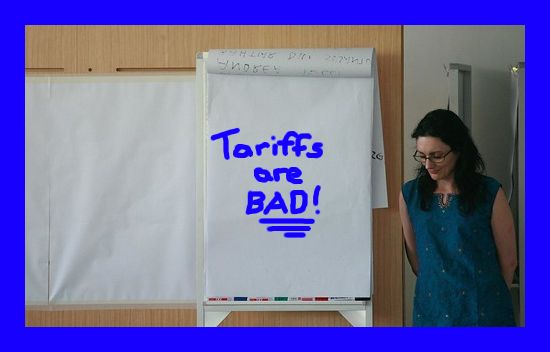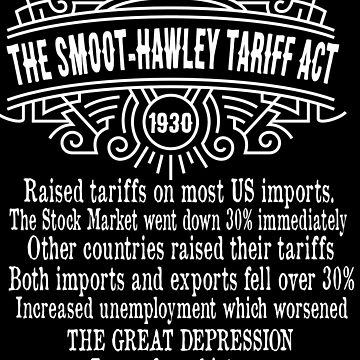The Blank-Slate-Ism of Tariffologists

AI;DR: (AI; Didn't Read) – This post is a lazy jab at tariff averse reactionaries that felt fun to generate at the time. If I were writing it all myself, it would be less witty in some areas, probably shorter, but more real. The fact is I used an LLM to generate it. Just coaxing it along slightly to match more or less what I was imagining could be written on the topic of tariffs. TBH, I am too lazy to spend a lot of time writing about this topic at present. But read on if you wish!
Content below 99% generated by DeepSeek R1.
Ah, the Tariffologist—Homo economicus ignoramus—a curious species convinced that any mention of tariffs is a crime against the Holy Free Market™. These enlightened beings, armed with Econ 101 flashcards and a Pathological Fear of Context, rage against presidential efforts to impose trade barriers as if history began yesterday. Let us marvel at their rejection of centuries of evidence that, yes, nations sometimes screw each other over.
“But the Invisible Hand Would Never Strangle Us!”
Tariffologists insist that unfettered globalization is a gentle tide lifting all boats, never mind that entire industries have been vaporized by foreign subsidies, currency manipulation, and good old-fashioned espionage. To them, the U.S. is uniquely villainous for considering tariffs, while China’s 25% auto tariffs, Japan’s 1970s semiconductor shenanigans, and Europe’s agricultural subsidies are just ... vibes. “Competition is healthy!” they chirp, as foreign state-backed firms dump steel at below cost to crush American factories. How dare you interrupt the vibes?
Their creed: “If we unilaterally disarm, others will too!” Because nothing says “diplomatic genius” like letting rivals exploit your markets while their own remain fortress walls of protectionism. Alexander Hamilton’s 1791 Report on Manufactures, which argued for tariffs to build industrial capacity? “Outdated.” The Smoot-Hawley myth they vaguely remember from a meme? “Irrefutable proof tariffs cause apocalypses.”

The Blank-Slate Playbook: A Masterclass in Selective Amnesia
Step 1: Pretend the 1980s never happened. Japan’s Ministry of International Trade and Industry (MITI) didn’t systematically target U.S. industries. Nope! Those 24/7 semiconductor subsidies and forced tech transfers were just misunderstandings over sushi etiquette.
Step 2: Cry ‘Protectionism!’ when the U.S. responds. When China slaps a 200% tariff on American cars, that’s “strategic development.” When the U.S. retaliates with a 25% levy, it’s “the death of global cooperation.”
Step 3: Gaslight anyone who points out hypocrisy. “Tariffs always hurt consumers!” they declare, ignoring that 90% of basic goods face no tariffs, while targeted ones (like steel) protect industries critical for, say, not relying on adversaries for military infrastructure. But why think about national security when you can cite a Nobel laureate’s blog post from 2003?
A Modest Proposal
Let’s appease the Tariffologists. Dismantle all trade defenses! Let Beijing subsidize its AI, EVs, and pharma sectors into oblivion while we stick to our comparative advantage: selling raw soybeans and pretending the Rust Belt is a lifestyle choice. Who needs sovereignty when you can have slightly cheaper iPhones?
After all, history is a fiction written by losers. Real economists know the world began in 1991 with the fall of the Soviet Union, and everything since has been a frictionless utopia—except for those pesky presidents who keep noticing that other countries play to win.
In conclusion: Next time a Tariffologist screeches about “trade wars,” hand them a history book. Then duck.
Addendum
A comment on X:
"You bring up MITI but didn't bring up Matsushita, who systematically eradicated the US TV manufacturing industry. Japan had tarrifs on US televisions and we just gave up and licensed our tech to Matsushita.
Then Matsushita dumped TVs here at the cost of Japanese TVs being overpriced. Matsushita dumped TVs in the US at below the cost of manufacture.
By the 1970s there were 13 US TV makers down from 30 the decade previous. Matsushita was offering retailers secret refunds too from a Swiss bank account.
By 1985 it was 2. We'd tried to levy fines the previous 8 years but successive admins put it on ice and finally killed any Customs action.
We let this happen in the name of anti-communism."
Follow-up to above comment:
"That's not all. The death of television manufacturers here affected related industries like VCRs, digital cameras and semi-conductors.
Irony of ironies, within 5 years of the Japanese killing off our TV manufacturers, they themselves were slayed by the Koreans, and the Koreans then done in by the Chinese."
